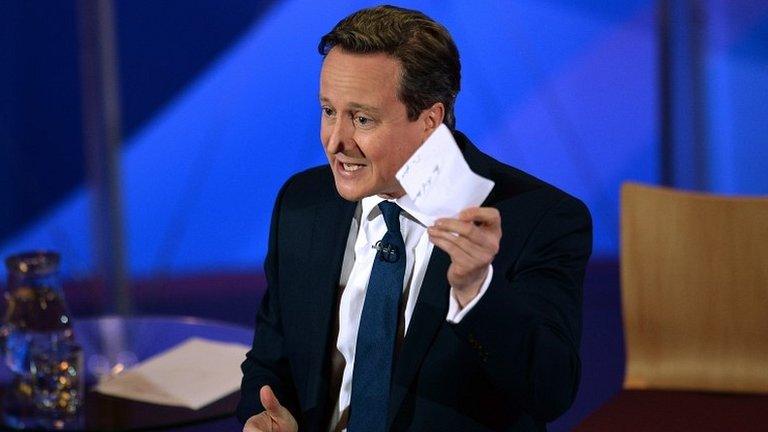Election 2015: Parties clash over second referendum during FMQs
- Published
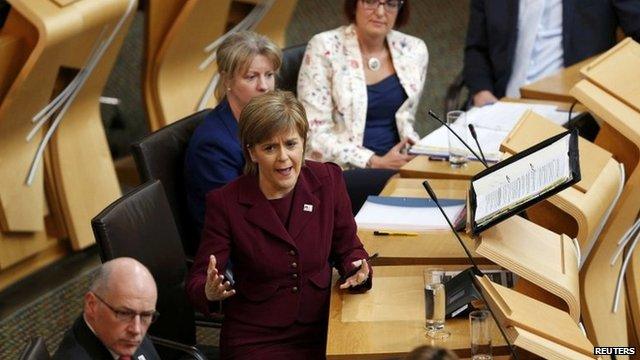
Nicola Sturgeon was quizzed about the prospects of a second Scottish independence referendum during FMQs
SNP leader Nicola Sturgeon told MSPs at Holyrood that "nobody was proposing" a second independence referendum.
Her response came during questioning from Labour's Kezia Dugdale and the Lib Dem's Willie Rennie.
Scottish Conservative leader Ruth Davidson described as a "scandal" new figures showing a drop in literacy levels in Scotland's schools.
First Minister's Questions took place a week before UK voters go to the polls to choose their next MP.
The half-hour weekly question and answer session began with Ms Dugdale accusing the SNP of being obsessed with the constitution.
She called on Ms Sturgeon to repeat her assertion that last year's referendum - in which 55% of voters in Scotland rejected independence - was a "once-in-a-lifetime opportunity".
Ms Dugdale said: "The promise was that the referendum was a once-in-a-lifetime event. That no matter how we voted as a nation we would get back to dealing with the really important issues.
"Like the fact that the reading levels of kids of all ages in Scotland have declined in the last two years.
"Like the fact that next to no progress has been made to close the gap between those in the poorest and wealthiest backgrounds in our schools.
"The first minister has all this power at her disposal but what is it for if it's not to transform the the lives of working-class kids?"
However, Ms Sturgeon said that if the people of Scotland wanted a referendum to be a "once-in-a-lifetime opportunity", that is what it would be.
She added: "This is desperate, last-throw-of-the-dice stuff from Scottish Labour. Talk about a party in its death throes.
"The desperate scaremongering over full fiscal autonomy clearly hasn't made any impact, although actually that's not true, it has made an impact on the polls: the SNP poll rating has gone up.
"Given that it hasn't helped Scottish Labour, they're now resorting to desperate scaremongering about a referendum that nobody is proposing."
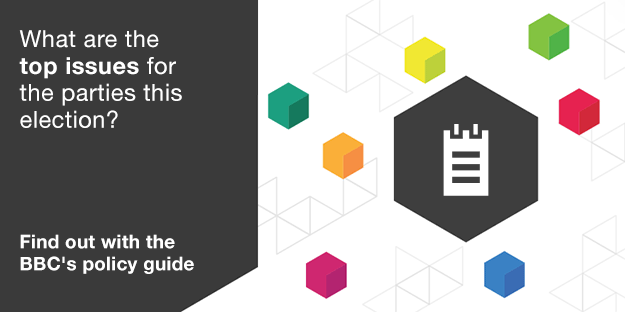
Continuing with the referendum question, Mr Rennie challenged the first minister to rule out a vote in the next term of the Scottish Parliament.
He said: "This is the neverendum that we warned about. We saw the consequences of the whole machinery of government being focused on the referendum for the last three years.
"The NHS and the police bear witness to that problem, and in Quebec, we have seen the long period of political uncertainty and the economic consequences of that.
"That's why people are concerned about this. They are concerned on the doorsteps."
Ms Sturgeon responded by saying that the people in Scotland were in charge.
She added: "What people are saying to me on the streets and doorsteps of Scotland is not about another referendum, their concerns are about the cuts that his (Mr Rennie's) party, hand in hand with the Tories, have imposed over the past five years."

ANALYSIS
By Brian Taylor, political editor BBC Scotland
Kezia Dugdale (Labour deputy leader) persisted, once more. Ms Sturgeon owed it to voters right now, she argued, to indicate the direction of travel with regard to a possible referendum. The First Minister insisted once more that this UK General Election was not about independence, not about a referendum, not about a mandate for a referendum.
Ms Dugdale persisted, once more. Jim Sillars, the former Deputy Leader of the SNP, had said that a referendum must be in the first line of the party's 2016 manifesto. Ms Sturgeon said the key word was "former". She was the current leader.
Undeterred, Willie Rennie of the Liberal Democrats pursued the same topic - while deliberately eschewing stagecraft. The FM could, he said, make a statement "right here" ruling out the inclusion of a referendum in next year's manifesto.
Perhaps it was his demeanour, perhaps it was because he isn't Labour, but the FM appeared to give a more detailed answer - without giving any ground.
There would have to be some change to prevailing circumstances. Otherwise there would be no proposal for a further referendum. If proposed, folk would have to endorse the party proposing it in an election. Even then, there would be a parliamentary process before such a referendum could proceed.

Earlier, former deputy leader of the SNP Jim Sillars predicted the party would propose another independence referendum in its manifesto for re-election to Holyrood next year.
Ms Sturgeon said she had great respect for Mr Sillars but she was leader of the party and this election was not about Scottish independence.
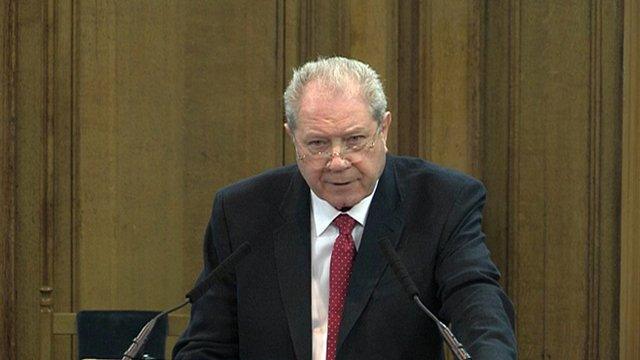
Former SNP deputy leader Jim Sillars has predicted a second referendum would happen
In other exchanges Ms Davidson highlighted falling literacy levels.
She said: "On the campaign each party is rightly talking about opportunities for our young people.
"The best way to increase opportunity is through a good education.
"And yet we find yesterday that literacy skills in our schools are getting worse not better."
Ms Davidson added: "I know that the Scottish government yesterday hastily put together a press release filled with action plans and improvement frameworks for this, but does the first minister really think this is adequate to tackle what is becoming a crisis in school standards?"
Ms Sturgeon said the results were not good enough and she was determined to improve them.
The first minister will face opposition leaders in Holyrood again next week. But the Q&A session has been moved from its traditional slot at midday on Thursday, which will be polling day, to Wednesday afternoon.
This week's first minister's questions can be viewed at BBC Scotland's Democracy Live website.

On the campaign trail - 30 April
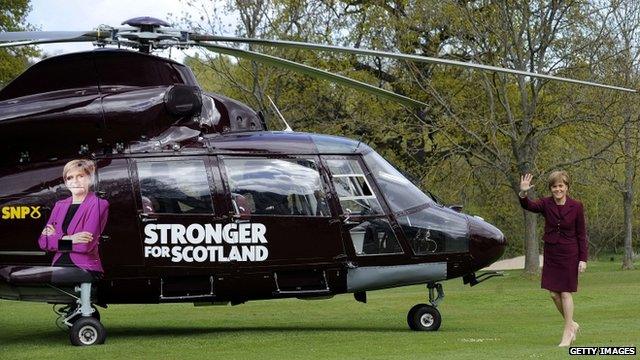
SNP leader Nicola Sturgeon boards a helicopter in Edinburgh as she begins a tour of Scotland ahead of the 7 May election
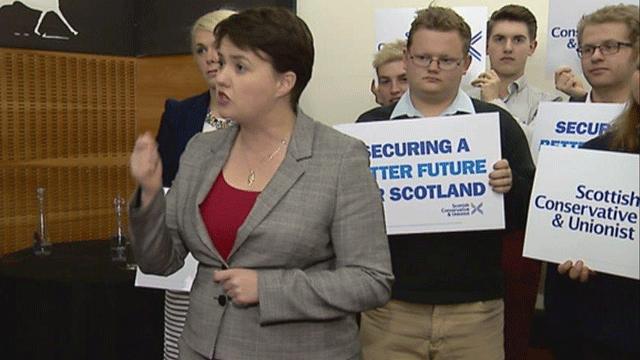
Ruth Davidson delivered her election message to Conservative Party activists in Edinburgh
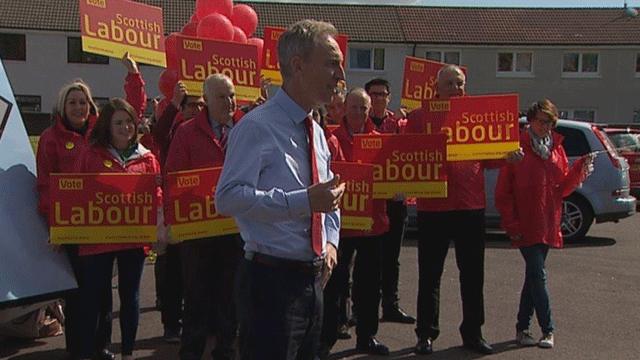
Scottish Labour leader Jim Murphy was on the streets campaigning with party volunteers
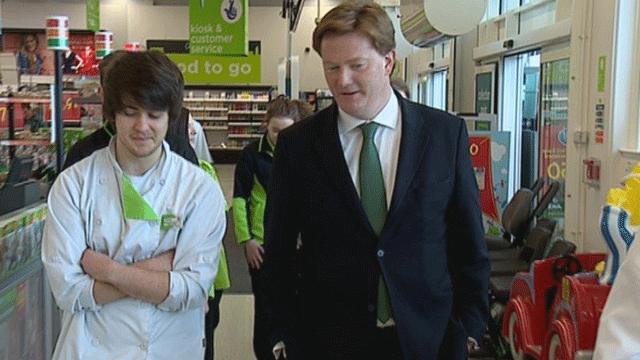
Liberal Democrat Danny Alexander was meeting voters with a week to go to polls opening
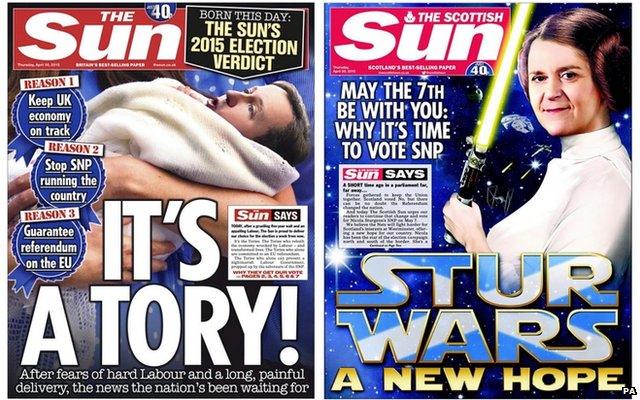
Contrasting headlines - The Sun endorsed the Tories and the Scottish Sun endorsed the SNP ahead of next week's election
- Published30 April 2015
- Published30 April 2015
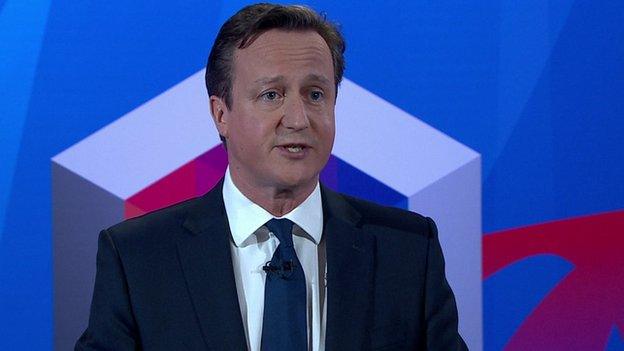
- Published30 April 2015
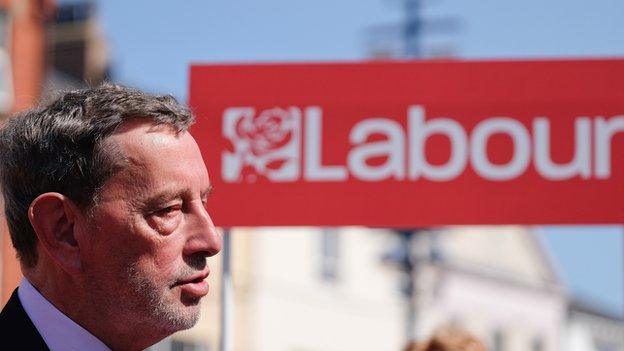
- Published30 April 2015
